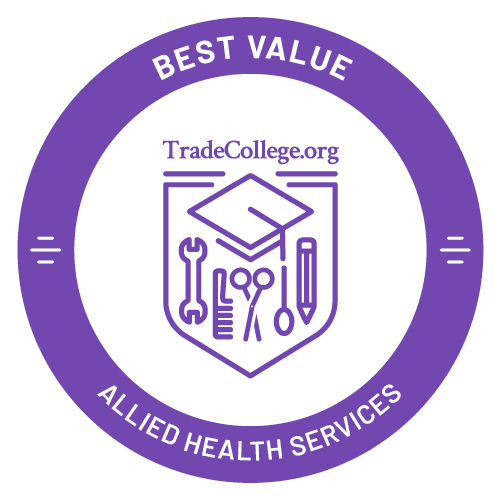Find Trade Colleges
2023 Best Value Allied Health Services Bachelor's Degree Schools in the Middle Atlantic Region
Highlighting Quality Schools With More Affordable Pricing
Finding the Best Allied Health & Medical Assisting Services Bachelor's Degree School for You
With 83,587 degrees and certificates handed out in 2021-2022, allied health & medical assisting services is the #3 most popular major in the United States.
There are so many trade school programs in today's world that it can tough to figure out which one is the right one for you. Along with traditional schools that require in-person attendence, you can attend one of many reputable online schools. Some programs even offer a hybrid experience.
The Best Value Allied Health Services Bachelor's Degree Schools in the Middle Atlantic Region ranking is one of many tools that Trade College Search has developed to help you make your educational decision.
This ranking is not just a list of inexpensive schools. We also consider each school's quality, since we believe a low-quality school may not be a 'bargain' at any price. Specifically, our score for quality is discounted by the published tuition and fees charged by the given college. This gives the cost per unit of quality for each college. The more quality your dollar buys, the better the value.
For nationwide and regional rankings, we use out-of-state tuition and fees in our calculations. For statewide rankings, we use average in-state tuition and fees.
Featured schools near , edit
The following school tops our list of the Best Value Allied Health & Medical Assisting Services Bachelor's Degree Colleges.
Best Allied Health & Medical Assisting Services Bachelor's Degree School
Our 2023 rankings named Widener University the best value school in the Middle Atlantic Region for allied health & medical assisting services students working on their bachelor’s degree. Located in the large suburb of Chester, Widener is a private not-for-profit school with a medium-sized student population.
The average tuition and fees for an out-of-state undergraduate student at Widener are $51,639 a year. While working on their Bachelor's Degree, medical assisting majors at Widener accumulate an average of around $26,899 in student debt.
As a testament to the quality of education it offers, Widener also is in the top 15% of our Best Allied Health Services Bachelor’s Degree Trade Schools in the Middle Atlantic Region ranking.
Best Allied Health & Medical Assisting Services Colleges by State
Explore the best allied health & medical assisting services schools for a specific state in the Middle Atlantic region.
| State | Degrees Awarded |
|---|---|
| New York | 3,605 |
| Pennsylvania | 1,726 |
| New Jersey | 1,749 |
| Maryland | 676 |
| Delaware | 183 |
| District of Columbia | 67 |
Allied Health & Medical Assisting Services Related Majors for Medical Assisting
One of 11 majors within the trade school area of study, allied health & medical assisting services has other similar majors worth exploring.
Medical Assisting Concentrations
Majors Similar to Medical Assisting
| Related Major | Annual Graduates |
|---|---|
| Health & Medical Administrative Services | 88,600 |
| Practical Nursing & Nursing Assistants | 85,339 |
| Allied Health Professions | 83,905 |
| Health Sciences & Services | 36,762 |
| Mental & Social Health Services | 30,331 |
Notes and References
*These values are for the top school only.
- The Integrated Postsecondary Education Data System (IPEDS) from the National Center for Education Statistics (NCES), a branch of the U.S. Department of Education (DOE) serves as the core of the rest of our data about colleges.
- Some other college data, including much of the graduate earnings data, comes from the U.S. Department of Education’s (College Scorecard).
More about our data sources and methodologies.


